
Nepenthes albomarginata is a tropical pitcher plant native to Borneo, Peninsular Malaysia, and Sumatra.

Nepenthes rafflesiana, or Raffles' pitcher-plant, is a species of tropical pitcher plant. It has a very wide distribution covering Borneo, Sumatra, Peninsular Malaysia, and Singapore. Nepenthes rafflesiana is extremely variable, with numerous forms and varieties described. In Borneo alone, there are at least three distinct varieties. The giant form of this species produces enormous pitchers rivalling those of N. rajah in size.
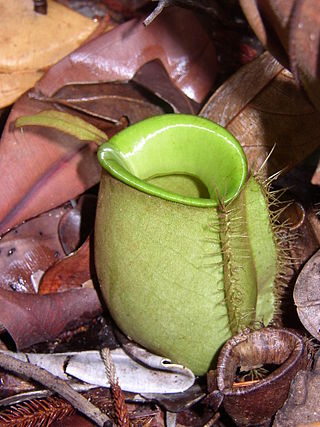
Nepenthes ampullaria is a very distinctive and widespread species of tropical pitcher plant, present in Borneo, the Maluku Islands, New Guinea, Peninsular Malaysia, Singapore, Sumatra, and Thailand.

Nepenthes gracilis, or the slender pitcher-plant, is a common lowland pitcher plant that is widespread in the Sunda region. It has been recorded from Borneo, Cambodia, Peninsular Malaysia, Singapore, Sulawesi, Sumatra, and Thailand. The species has a wide altitudinal distribution of 0 to 1100 m above sea level, although most populations are found below 100 m and plants are rare above 1000 m. Despite being a widespread plant, natural hybrids between N. gracilis and other species are quite rare.

Nepenthes reinwardtiana is a tropical pitcher plant native to Borneo and Sumatra and to a number of smaller surrounding islands including Bangka, Natuna, Nias, and Siberut. Although some sources have included Peninsular Malaysia and Singapore within the range of this species, these records appear to be erroneous.

Nepenthes veitchii, or Veitch's pitcher-plant, is a Nepenthes species from the island of Borneo. The plant is widespread in north-western Borneo and can also be found in parts of Kalimantan. It grows in lowland Dipterocarp forest, typically near rivers, and on ridgetops in mossy forests, from 0 to 1,600 meters elevation. Nepenthes veitchii usually grows as an epiphyte, though the form from Bario seems to be strictly terrestrial and has not been observed to climb trees.

Nepenthes mirabilis, or the common swamp pitcher-plant and tropical pitcher plant, is a carnivorous plant species. By far the most widespread of all Nepenthes, its range covers continental Southeast Asia and all major islands of the Malay Archipelago, stretching from China in the north to Australia in the south. The species exhibits great variability throughout its range. One of the more notable varieties, N. mirabilis var. echinostoma, is endemic to Brunei and Sarawak and possesses an extremely wide peristome.
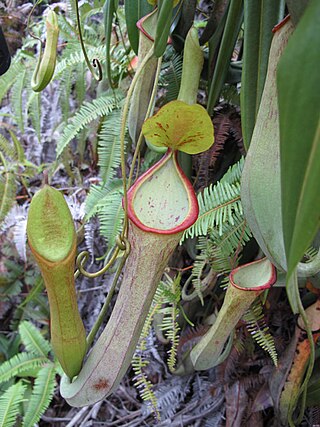
Nepenthes macrovulgaris, or the serpentine pitcher-plant, is a tropical pitcher plant endemic to Borneo. It is a lowland plant that typically grows at altitudes ranging from 300 to 1200 m in sub-montane forest clearings and mossy forest. Its range is restricted to ultramafic habitats, including Mount Kinabalu, Mount Tambuyukon, the Danum Valley, the Tawai Range, the Meliau Range and Mount Silam, all in Sabah, Malaysian Borneo. Pitchers grow to around 25 cm high and range in colour from green to brown, with the speckled form being the most common.

Nepenthes stenophylla, or the narrow-leaved pitcher-plant, is a tropical pitcher plant endemic to Borneo. The species produces attractive funnel-shaped pitchers up to 25 cm high. It is listed as Least Concern on the IUCN Red List. Nepenthes stenophylla belongs to the loosely defined "N. maxima complex", which also includes, among other species, N. boschiana, N. chaniana, N. epiphytica, N. eymae, N. faizaliana, N. fusca, N. klossii, N. maxima, N. platychila, and N. vogelii.
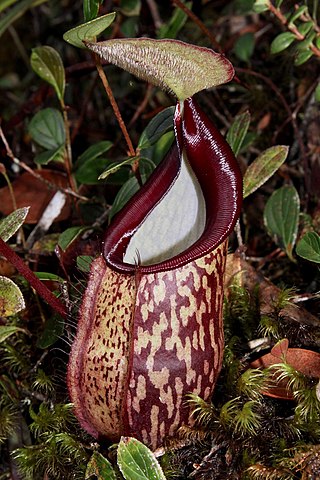
Nepenthes macfarlanei is a carnivorous pitcher plant species endemic to Peninsular Malaysia. It produces attractive red-speckled pitchers. Lower pitchers are ovoid or infundibular in the lower half and globose or cylindrical above and up to 25 cm high. Upper (aerial) pitchers are of a lighter colour with wings reduced to ribs. The lower surface of the lid is densely covered with short, white hairs. This is a characteristic morphological feature of this species, but at present its function is unknown.

Nepenthes maxima, the great pitcher-plant, is a carnivorous pitcher plant species of the genus Nepenthes. It has a relatively wide distribution covering New Guinea, Sulawesi, and the Maluku Islands. It may also be present on Wowoni Island.
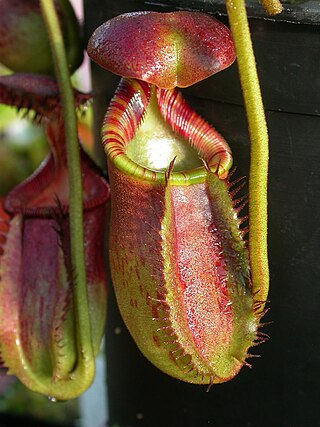
Nepenthes ephippiata, or the saddle-leaved pitcher-plant, is a tropical pitcher plant endemic to Borneo. It occurs in the Hose Mountains of central Sarawak, as well as Mount Raya and Bukit Lesung in Kalimantan. It grows in montane forest from 1,000 to 1,900 meters elevation.
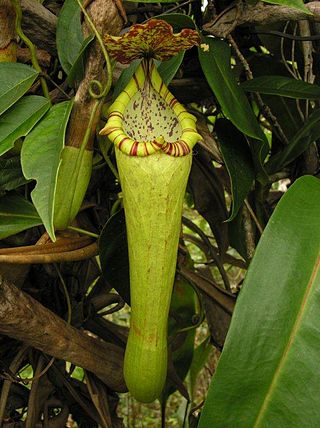
Nepenthes boschiana, or Bosch's pitcher-plant, is a tropical pitcher plant endemic to Borneo. It is most closely allied to N. faizaliana. Nepenthes borneensis is considered a synonym of this species. Nepenthes boschiana has no known natural hybrids. No valid forms or varieties have been described. Nepenthes boschiana belongs to the loosely defined "N. maxima complex", which also includes, among other species, N. chaniana, N. epiphytica, N. eymae, N. faizaliana, N. fusca, N. klossii, N. maxima, N. platychila, N. stenophylla, and N. vogelii.
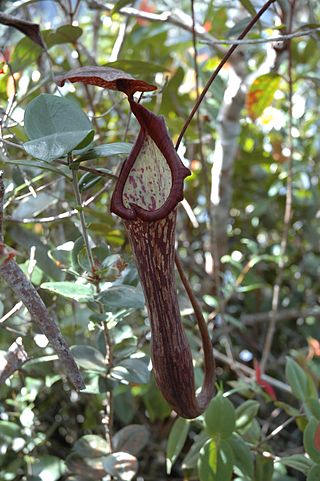
Nepenthes faizaliana is a tropical pitcher plant endemic to the limestone cliffs of Gunung Mulu National Park in Sarawak, Borneo. It is thought to be most closely related to N. boschiana.
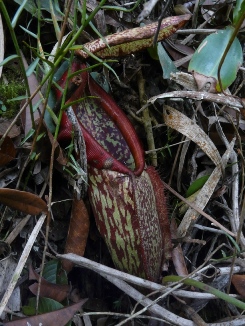
Nepenthes mapuluensis, the Mapulu pitcher-plant, is a species of tropical pitcher plant native to East Kalimantan, Borneo. It is known only from a restricted geographical range and is listed as Endangered on the IUCN Red List.
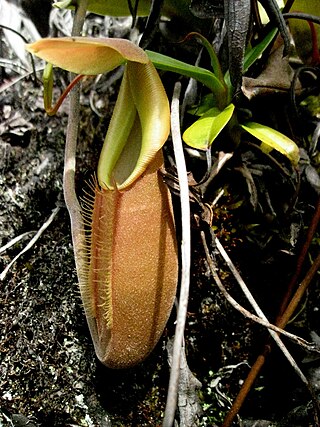
Nepenthes bongso is a tropical pitcher plant endemic to Sumatra, where it has an altitudinal distribution of 1000–2700 m above sea level. The specific epithet bongso refers to the Indonesian legend of Putri Bungsu, the spirit guardian of Mount Marapi.
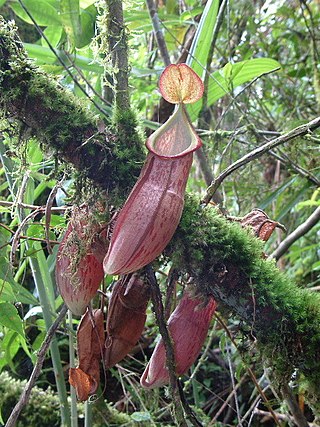
Nepenthes gymnamphora is a tropical pitcher plant native to the Indonesian islands of Java and Sumatra. It has a wide altitudinal range of 600–2,800 metres (2,000–9,200 ft) above sea level. There is much debate surrounding the taxonomic status of this species and the taxa N. pectinata and N. xiphioides.

Nepenthes × hookeriana, or Hooker's pitcher-plant, is a common natural hybrid involving N. ampullaria and N. rafflesiana. It was originally described as a species.

Nepenthes × trichocarpa, the dainty pitcher-Plant, is a common natural hybrid involving N. ampullaria and N. gracilis. It was originally thought to be a distinct species and was described as such.

Nepenthes chaniana is a tropical pitcher plant species belonging to the genus Nepenthes. It is characterised by a dense indumentum of long, white hairs. Pitchers are cylindrical and mostly white to yellow in colouration. Nepenthes chaniana belongs to the loosely defined "N. maxima complex", which also includes, among other species, N. boschiana, N. epiphytica, N. eymae, N. faizaliana, N. fusca, N. klossii, N. maxima, N. platychila, N. stenophylla, and N. vogelii.






















